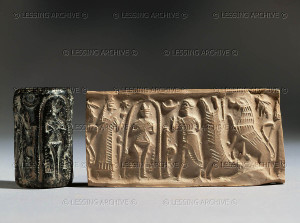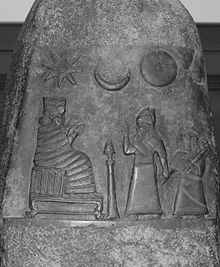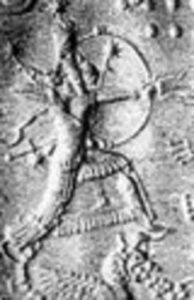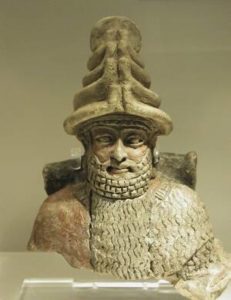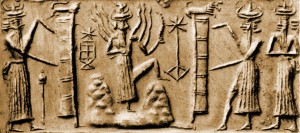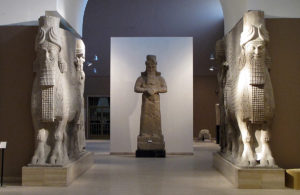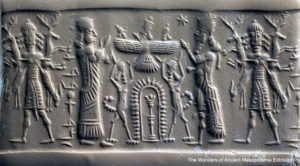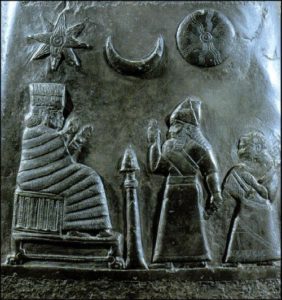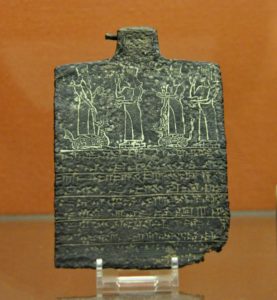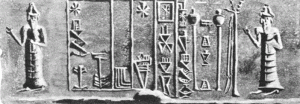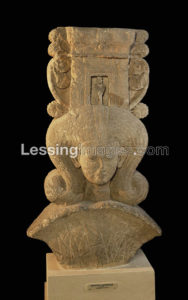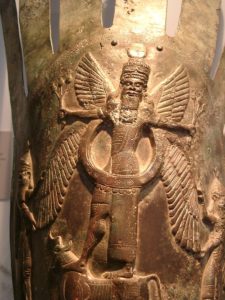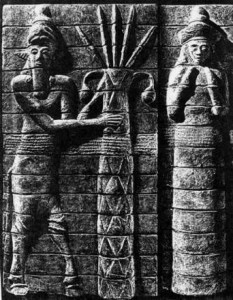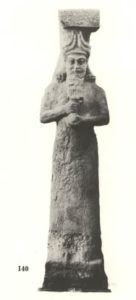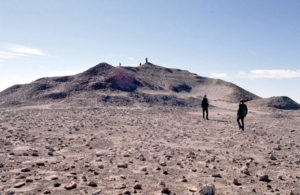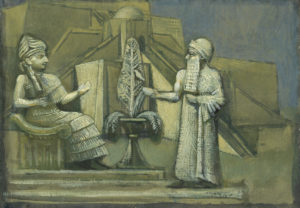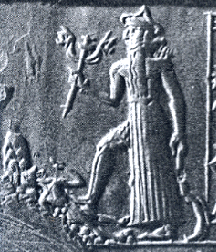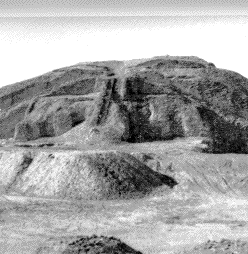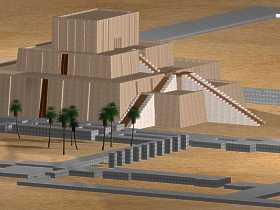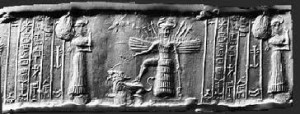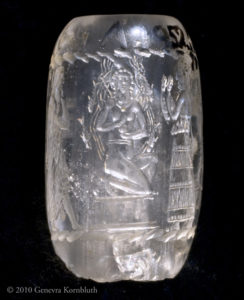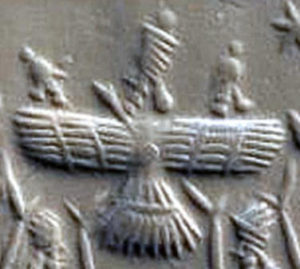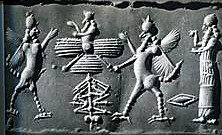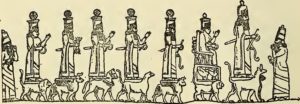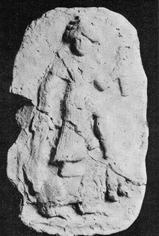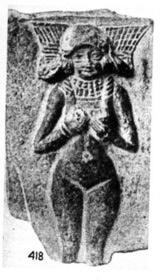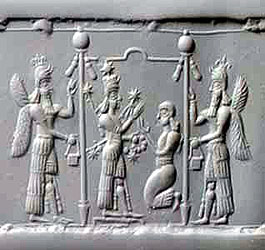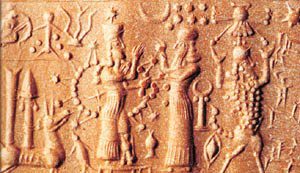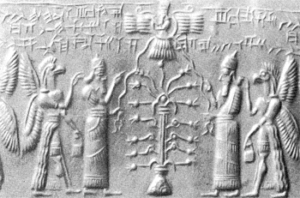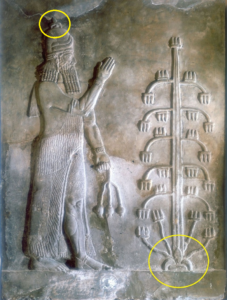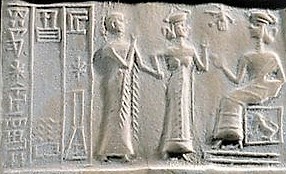SPOUSE & LOVER TO SCORES & SCORES OF MIXED-BREED KINGS OVER THOUSANDS & THOUSANDS OF YEARS
(Texts: All Artifacts, Color Coding, & Writings in Bold Type With Italics Inside Parenthesis, are Added by Editor R. Brown, not the Authors, Translators, or Publishers!)
(gods in blue …mixed-breed demigods in teal…)
“To woo thee to thine Ishtar’s (Inanna’s) marriage bed …”
“This giant‘s form the gods have surely made …”
With Etana King of Kish, Ruled 1,200 Years & Ascended to Heaven:
“No king did they establish, over the teeming peoples,
At that time no headdress had been assembled, nor crown,
Nor yet scepter had been set with lapis.
No throne daises whatsoever had been constructed,
Ishtar (Inanna) came down from heaven to seek a shepherd,
And sought for a king everywhere.
Innina (Inanna) came down from heaven to seek a shepherd,
And sought for a king everywhere.
Enlil examined the dais of Etana,
The man whom Ishtar steadfastly….
‘She has constantly sought….
‘Let kingship be established in the land,
Let the heart of Kish be joyful’ …”
“He was about to tell Her (Inanna) how sorry he was for not having been able
to give Her an heir of his blood, …”
“Inanna, Ishtar, Astarte, many are your names.
But I know You as the Eternal Moment in Me, my Soul Counterpart,
Lover and Beloved as One, …”
With Enmerkar King of Uruk, Ruled 2,800 + B.C.:
“She made Enmerkar, her spouse, occupy the throne-dais with her …”
“the ever-sparkling lady gives me my kingship …”
(Enmerker speaking to Inanna):
“may I, the radiant youth, may I be embraced there by you …”
“He (Ensuhgiranna) may dwell with Inanna in the E-zagin of Aratta,
but I dwell with her …… as her earthly companion (?).
He may lie with her in sweet slumber on the adorned bed,
but I lie on Inanna‘s splendid bed strewn with pure plants ….”
“I accompany Inanna for a journey of 15 leagues.
and yet Utu the sun-god cannot see my holy crown, when she enters my holy jipar.
Enlil has given (?) me the true crown and scepter.
Ninurta, the son of Enlil, held me on his lap as the frame holds the water-skin.
Aruru (Ninhursag), the sister of Enlil,
extended her right breast to me, extended her left breast to me.
When I go up to the great shrine,
the mistress (Inanna) screeches like an Anzud chick,
and other times when I go there, even though she is not a duckling, she shrieks like one…”
“It is Unug where Inanna dwells …”
“Lugalbanda (son to Enmerker &Inanna), he of beloved seed, stretched his hand out (and said)
‘Like divine Shara am I, the beloved son of Inanna (& Enmerkar)‘ …”
With Ensuhgirana King of Aratta, Ruled 2,800 B.C.:
“En-suhgir-ana,… saying…he may dwell with Inanna in the E-jar,
but I dwell with Inanna in the E-zagin of Aratta;
he may lie with her on the splendid bed,
but I lie in sweet slumber with her on the adorned bed,
he may see dreams with Inanna at night, but I converse with Inanna awake …”
“En-suhgir-ana sent a man to Enmerkar:
‘You are the beloved lord of Inanna, you alone are exalted.
Inanna has truly chosen you for her holy lap, you are her beloved’…
and I am only second to you;
From the moment of conception I was not your equal, you are the older brother.
I cannot match you ever …”‘
With Gilgamesh King of Uruk, Ruled 2,700 + B.C.:
“goddess Ishtar (Inanna), Queen of Love,
And Izdubar (Gilgamesh), with softest measure move;
Great Samas’ (Utu / Shamash) son, of him dear Zir-ri (unidentified?) sing!
Of him whom goddess Ishtar warmly wooed, …
The lovely queen beside him now doth lay,
And leads his soul along the blissful way
That comes to every heart that longs for love,
When purest joy doth bless us from above;
From her soft liquid eyes the love-light speaks,
And her warm hands she lays in his, and wakes
Beneath her touch a thrill of wild desire,
Until his blood now seems like molten fire.
Her eyes half closed begat a passion wild,
With her warm breast, her loves hath beguiled;
She nearer creeps with hot and balmy breath,
And trembling form aglow, and to him saith:
‘My lips are burning for a kiss, my love!’
A prize like this, a heart of stone would move,
And he his arms around her fondly placed
Till she reclined upon his breast, embraced,
Their lips in one long thrilling rapture meet. …”
“Of goddess Ishtar (Inanna) chant, and Izdubar,
The Queen of Love wed to the King of War. …”
“Have I embraced a god?”
He horrified now cries; and she doth nod …”
“And satisfied, turned where her lover laid;
And to his royal couch she crept again;
Her bliss will have despite of gods and men ...”
“Be you my (Inanna‘s) husband, and I will be your (Gilgamesh‘s) wife.
I will have harnessed for you a chariot of lapis lazuli and gold,
with wheels of gold and ‘horns’ of electrum(?).
It will he harnessed with great storming mountain mules!
Come into our house, with the fragrance of cedar.
And when you come into our house the doorpost(?) and throne dais (?)’ will kiss your feet. …”
“Gilgamesh did sit on his throne.
Divine Eanna (Inanna) saw him and was overwhelmed with lust.
‘Be my lover. Love me as a husband does a wife.
Give me your seed, give me your semen.
Plant your seed in my womb….
Have sex with me and all this shall become yours.’ …”
“Gilgamesh to these words did reply:
‘What may I offer in return, Queen of Love?
You have everything.You want for all I state merely my cock?
Why not I give you the food and drinks of the gods?
I have nothing for she who has all.
What happens when your desire burns out?
What happens when you leave?
Shall I love the cold air left?
Shall I have after only your memory, a tar that won’t wash away?
Where are your lovers past and your husbands too?
Dumuzi the shepherd, slain for your gain,
forced to live underground While you play above.
And then their was that courtier who fluttered into your snare.
Do you hear his cries ever since?
My wing is broken; broken is my wing.
A mighty lion did you fuck, and when his seed was in your sack
You led him to a hunter’s pit seven times seven deep, and left him to rot.
You broke a wild horse and in his mouth placed harsh bit
By let him take you hindermost,
And then hobbled him
So he can drink the water of a stream his hoofs muddied all the while.
You took each sacrificed kid,ate the proffered cakes and drank from a goat-herder sweet
and in return into wolf did you him turn, which dogs did follow and bite.
With no further thought of that ex-lover you quickly turned to
Your father’s gardener Ishullanu whom you did tease when sweet figs and dates for you.
‘Ishullanu, come touch me here between my legs,
Put your fingers deep within my sacred sack,
I have no clothes on to halt your way.’
And to you did Ishullanu say,
‘Why, Eanna (Inanna), should I eat your rotten meal,
When a tasty healthy meal could be mine?’
Why should I sin
And be accursed to lie
Cold, hungry and afright in wild marsh land?’
Now some say that you, Eanna so kind, turned into a frog who does croak:
‘I know not, I know not at all’.
And some say that you turned his penis into a mole
Stuck in a tunnel in the ground which
He can pull not out nor push further in.
So Eanna, so sweet and kind,
Which of these fates do you wish me find’? …”
“From heaven down did Eanna come with roar and shout.
On high tower of Uruk did she stand and curse all below.
Woe be to all because of Gilgamesh.
For insult to Eanna by his telling all her myriad ways.
For insult to Eanna by killing her punisher the Bull of Heaven. …”
“Where are your bridegrooms that you keep forever
Where is your ‘Little Shepherd’ bird that went up over you!
See here now, I will recite the list of your lovers.
Of the shoulder (?) … his hand,
Tammuz (Dumuzi), the lover of your earliest youth,
for him you have ordained lamentations year upon year!
You loved the colorful ‘Little Shepherd’ bird and then hit him, breaking his wing,
so now he stands in the forest crying ‘My Wing’!
You loved the supremely mighty lion, yet you dug for him seven and again seven pits.
You loved the stallion, famed in battle,
yet you ordained for him the whip, the goad, and the lash,
ordained for him to gallop for seven and seven hours,
ordained for him drinking from muddled waters,’
you ordained far his mother Silili to wail continually.
You loved the Shepherd, the Master Herder,
who continually presented you with bread baked in embers,
and who daily slaughtered for you a kid.
Yet you struck him, and turned him into a wolf,
so his own shepherds now chase him and his own dogs snap at his shins.
You loved Ishullanu, your father’s date gardener,
who continually brought you baskets of dates, and brightened your table daily.
You raised your eyes to him, and you went to him:
‘Oh my Ishullanu, let us taste of your strength,
stretch out your hand to me, and touch our vulva.’
Ishullanu said to you:
‘Me! What is it you want from me!
Has my mother not baked, and have I not eaten that I should now eat food under contempt and curses
and that alfalfa grass should be my only cover against the cold?’
As you listened to these his words you struck him, turning him into a dwarf(?),
and made him live in the middle of his (garden of) labors,
where the mihhu do not go up, nor the bucket of dates (?) down.
And now me! It is me you love, and you will ordain for me as for them! …”
“When Ishtar heard this, in a fury she went up to the heavens,
going to Anu, her father (great-grandfather), and crying,
going to Anrum (Antu), her mother, and weeping:
‘Father, Gilgamesh has insulted me over and over,
Gilgamesh has recounted despicable deeds about me, despicable deeds and curses!’
Anu addressed Princess Ishtar, saying:
‘What is the matter?
Was it not you who provoked King Gilgamesh?
So Gilgamesh recounted despicable deeds about you, despicable deeds and curses!’
Ishtar spoke to her father, Anu, saying:
With Shulgi King of Ur, Ruled 2,029-1,982 B.C.:
Inanna…invited Shulgi to Erech (Uruk), making him “a man chosen for the vulva of Inanna.”...
Shulgi‘s own words:
“With valiant Utu, a friend as a brother,
I drank strong drink in the temple founded by Anu.
My minstrels sang for me the seven songs of love.
Inanna, the queen, the vulva of heaven and earth,
was by my side, banqueting in the temple…”
“I am Culgi, who has been chosen by Inanna for his attractiveness. …”
“I drank beer in the palace founded by An with my brother and companion, the hero Utu.
My singers praised me with songs accompanied by seven tigi drums.
My spouse, the maiden Inanna, the lady, the joy of heaven and earth, sat with me at the banquet.
Truly I am not boasting! …”
“You are cherished by Ninegala (Inanna)…”
“May the loving heart, Inana, never abandon you …”
With Ur-Ninurta King of Isin, Ruled 1,923-1,896 B.C.:
(King) “Ur-Ninurta, the youth whom you chose, in your honor an en priest.
Nintud (Ninhursag) has created attractiveness for him,
and has made him step forward to you for your admiration.
She has confirmed his lot as favorable, and has made him …… before you.
She has elevated as a prince the …… who is fitted for the emblem.
Your holy heart has driven you towards him as if to a pleasant sweet scent.
May he …… with you on your flowery bed which is full of delight.
May the attentive youth, the prince who is all for you…
him created from good seed …”
“Inana (Inanna), the great daughter of Suen (Nannar / Sin)
and Ur-Ninurta’s beloved spouse, gathered together ……
all the divine powers and placed them in his hand.
Together the two of them went forth joyfully
from Enlil‘s presence to take their seats in the palace,
the dwelling-place of sweet honey.
…… her king …… does not cease, as she speaks truly to him …”
“Ur-Ninurta,…
May Inana (Inanna), who is assuredly your beloved, provide you with long life …”
With Ishme-Dagon King of Isin, Ruled 1,953-1,934 B.C.:
“Ninurta prays to Enlil:
‘Please, look with favor on Icme-Dagan,
the accomplished shepherd, who is at your service in the dining-hall;
on the king who has built you the chariot!
Give him Inana your beloved eldest daughter as a spouse’…”
“Enki has given me (Ishme–Dagon) wisdom, that Ninurta is all for me (?),
that Nanna (Nannar / Sin) loves me greatly,
that I am the son-in-law of Ningal (Nannar’s spouse),
that Inana (Inanna / Ishtar) has made me attractive, …”
“Inana, the lady of heaven and earth ……, chose me as her beloved spouse.
She put attractiveness in my (Ishme-Dagan) waist-belt (?),
looking at me with her life-giving look,
as she lifted her radiant forehead to me,
to make me step onto the flowery bed …”
“May my spouse, a ewe cherishing its lamb, be praised with sweet admiration! …”
“Enlil and Ninlil gave her (King) Icme-Dagan,
the constant attendant, …… as her husband …….
The duty to build temples for the gods, to furnish their daily portions,
to purify their raised temples and to sanctify their daises,
to secure their daily liquor, syrup and choice beer in their dining hall —
all this was bestowed on Inana and Icme-Dagan by Enlil and Ninlil …”
With Iddin-Dagon King of Isin, Ruled 1,975-1,954 B.C.:
“The male prostitutes comb her hair…
They décor the neck with colored bands…
Their right side they adorn with woman’s clothing
as they walk before the pure Inanna…
Their left side they cover with mens clothing
as they walk before the pure Inanna.
With jump ropes and colored cords they compete before her…
The young men, carrying hoops, sing before her…
The maidens, Shugia priestesses, walk before Inanna…
They set up a bed for my lady,
They cleanse rushes with sweet smelling cedar oil;
For Inanna, for the King, they arrange the bed…
The king approaches her pure lap proudly;
Proudly he approaches the lap of Inanna…
He caresses her pure lap,
She stretches out on the bed, the pure lap;
She makes love with him on her pure bed.
She says to Iddin-Dagon: “Surely, you are my beloved. …”
“my lady bathes her holy thighs.
She bathes them for the thighs of the king; she bathes them for
(some mss. have instead: with head held high she goes to)
the thighs of (King) Iddin-Dagan.
Holy Inana rubs herself with soap;
she sprinkles oil and cedar essence on the ground.
The king goes to her holy thighs with head held high,
(some mss. add: she goes to the thighs of Iddin-Dagan,)
he goes to the thighs of Inana with head held high …”
“After the lady has made him rejoice with her holy thighs on the bed,
after holy Inana has made him rejoice with her holy thighs on the bed,
she relaxes (?) with him on her bed:
‘Iddin-Dagan, you are indeed my beloved!’…
She embraces her beloved spouse, holy Inana embraces him. …”
With Lipit-Ishtar King of Isin, Ruled 1,870-1,860 B.C.:
“my spouse holy Inanna made firm the foundation of my throne.
She will embrace me forever and eternally.
I will spend all day for the Mistress in the good
(1 ms.: lapis-lazuli (blue-hued gem stone)
bedchamber that fills the heart with joy!
I am Lipit-Ectar, the powerful heir;
I am the king that makes justice prominent.
May my name be called on in all the foreign lands!
I am Lipit-Ectar, Enlil‘s (giant mixed-breed) son.
It is sweet to praise me.”
“the spouse of the king…Inana, …… prince Lipit-Ectar on your holy lap …”
“the spouse of the king, the woman, the goddess who is worth of the ladyship,
surpassing heaven and earth. I will pay her due homage.
1 line unclear
…… great divine powers …….
She cherished Lipit-Ectar, the son of Enlil …”
“As the beloved husband of Inanna,
I lift my head high in the place Unug.
I am a proficient scribe of Nisaba (Enlil‘s mother-in-law).
I am a young man whose word Utu confirms.
I am the perfection of kingship.
I am Lipit-Ectar, Enlil‘s son …”
With Enlil-bani King of Isin, Rule 1,798-1,775 B.C.:
“Enlil-bani, you are the one who has authority.
Sweet mouth, lips good with words,
2 lines missing
husband of holy Inana (Inanna), …”
“In the E-ana (Anu‘s temple in Uruk), Inana has fixed a rejoicing heart
to be your lot and has you brought grandly into her holy bedchamber
to spend the night there. …”
With Shu-Kale-Tuda / Cu-kale-tuda:
“the mistress became so tired that when she arrived there she lay down by its roots.
I noticed her from beside my plot.
I had intercourse with her and kissed her there.
Then I went back to beside my plot.
When he had spoken thus to her, …… hit …….
…… added (?) …….
…… changed (?) him …….
She (?) determined his destiny ……,
holy Inanna spoke to Cu-kale-tuda:
‘So! You shall die!’…”
“Cu-kale-tuda was his name. ……, a son (?) of Igi-sigsig…
Cu-kale-tuda noticed her from beside his plot.
Inanna …… the loincloth (?) of the seven divine powers over her genitals.
…… the girdle of the seven divine powers over her genitals …….
…… with the shepherd Ama-ucumgal-ana (Dumuzi).……
…… over her holy genitals …….
Cu-kale-tuda undid the loincloth (?) of seven divine powers
and got her to lie down in her resting place.
He had intercourse with her and kissed her there.
After he had had intercourse with her and kissed her,
he went back to beside his plot …”
As a Prostitute:
“As a prostitute you go down to the tavern and,
like (?) a ghost who slips in through the window, you enter there.
Inana, you are the lady of all the divine powers,
and no deity can compete with you.
Here is your dwelling, Ninegala; let me tell of your grandeur!
When the servants let the flocks loose,
and when cattle and sheep are returned to cow-pen and sheepfold,
then, my lady, like the nameless poor, you wear only a single garment.
The pearls of a prostitute are placed around your neck,
and you are likely to snatch a man from the tavern.
As you hasten to the embrace of your spouse Dumuzid,
Inana, then the seven paranymphs share the bedchamber with you …”
“When I sit by the gate of the tavern,
I am a prostitute familiar with the penis;
the friend of a man, the girlfriend of a woman …”
“Inana, eldest daughter of Suen, lady of the evening, your praise is good! …”
